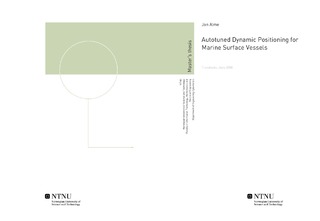Autotuned Dynamic Positioning for Marine Surface Vessels
Master thesis
Permanent lenke
http://hdl.handle.net/11250/259680Utgivelsesdato
2008Metadata
Vis full innførselSamlinger
Sammendrag
Dynamic positioning of surface vessels involves control of vessels with changing dynamics, shifting conditions, for different operational tasks. A controller with fixed controller parameters cannot have an optimal performance for all these different cases, and autotuning of the controller would be very valuable. However, dynamic positioning is a complex task, and thus automatic tuning of a dynamic positioning controller is not less so. This thesis does not solve all problems that comes with autotuning of dynamic positioning systems, but it gives an overview of the problem and presents a novel performance index for station keeping. Furthermore, a hybrid controller that can function as a first step in solving the autotuning problem is suggested. The hybrid controller has a fixed controller structure and is a combination of a gain-scheduling controller and an adaptive controller. The adaptive controller is used in an idle (training/learning) mode to populate a look-up table with controller parameters, while the gain-scheduling controller work as a fast-changing dynamical controller, using the controller parameters stored in the look-up table. Each controller parameter set in the look-up table is optimized according to a vessel operational condition, which is defined as a function of environmental conditions (wind, waves, ocean current), vessel draught, and water depth. Optimization of the controller parameters for the different vessel operational conditions is carried out by two different autotuning methods; a genetic algorithm and a rule-based algorithm. Both of these autotuning methods are optimizing the controller gains in a nonlinear PID-controller. The performance index and the two autotuning methods are implemented in Matlab/Simulink, where simulation tests are performed for a 3 DOF mathematical model of a supply vessel. The test scenario includes two different vessel operational conditions, where the controller has been automatically tuned both for minimal position and heading deviation as well as weighting on the use of forces. A comparison of the two autotuning methods is also performed and finally a discussion of the behaviour and tuning of the suggested performance index is carried out.
